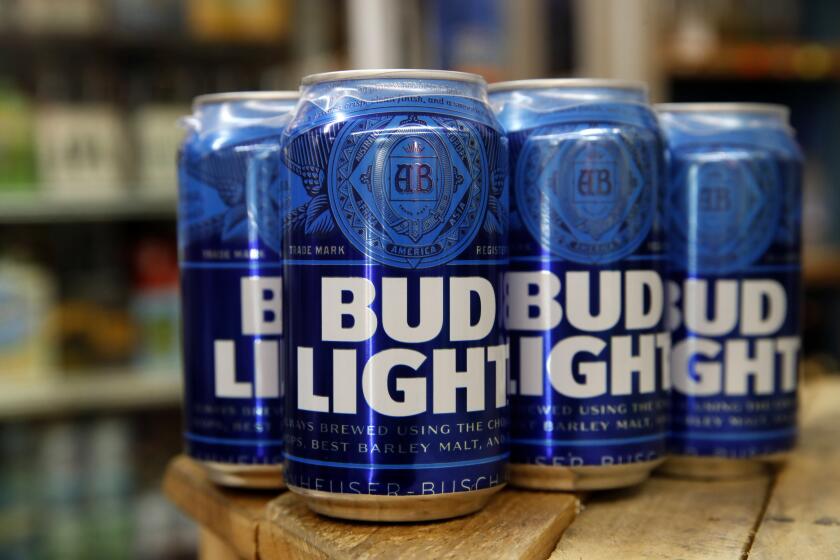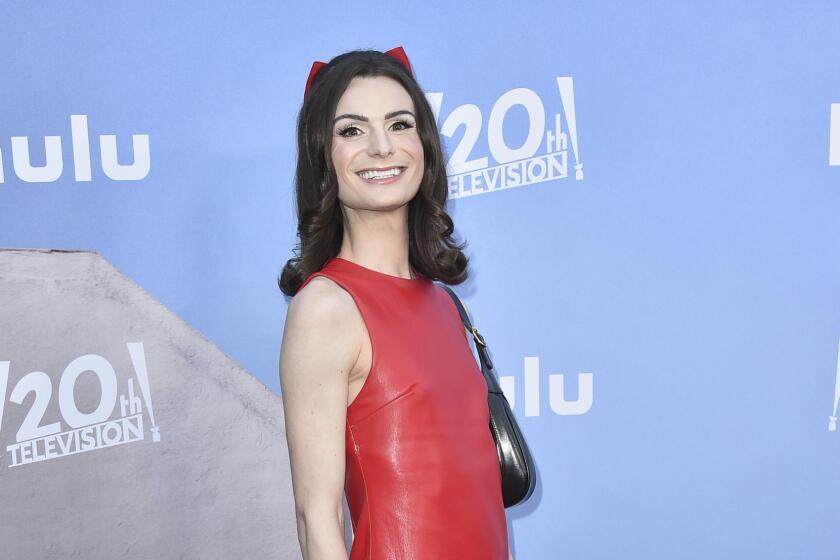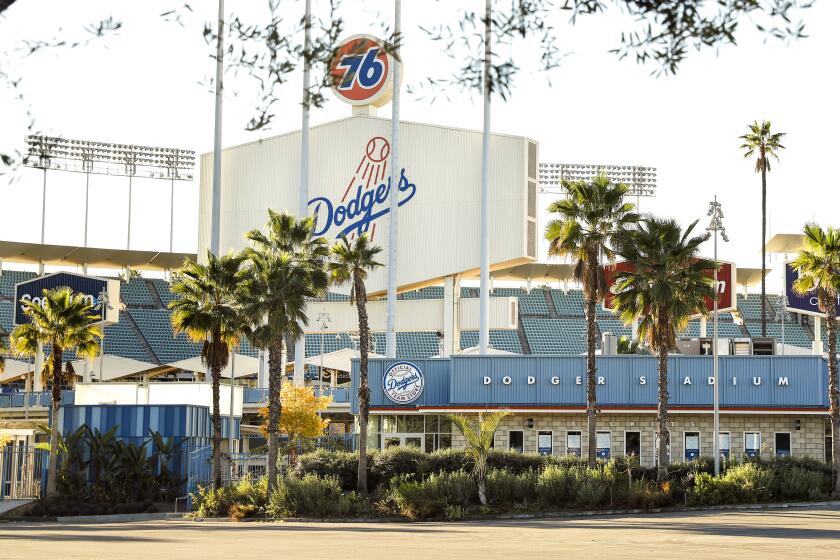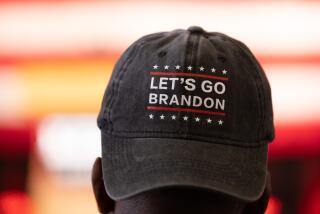Column: Why ‘Bud Lighting’ isn’t stopping any time soon
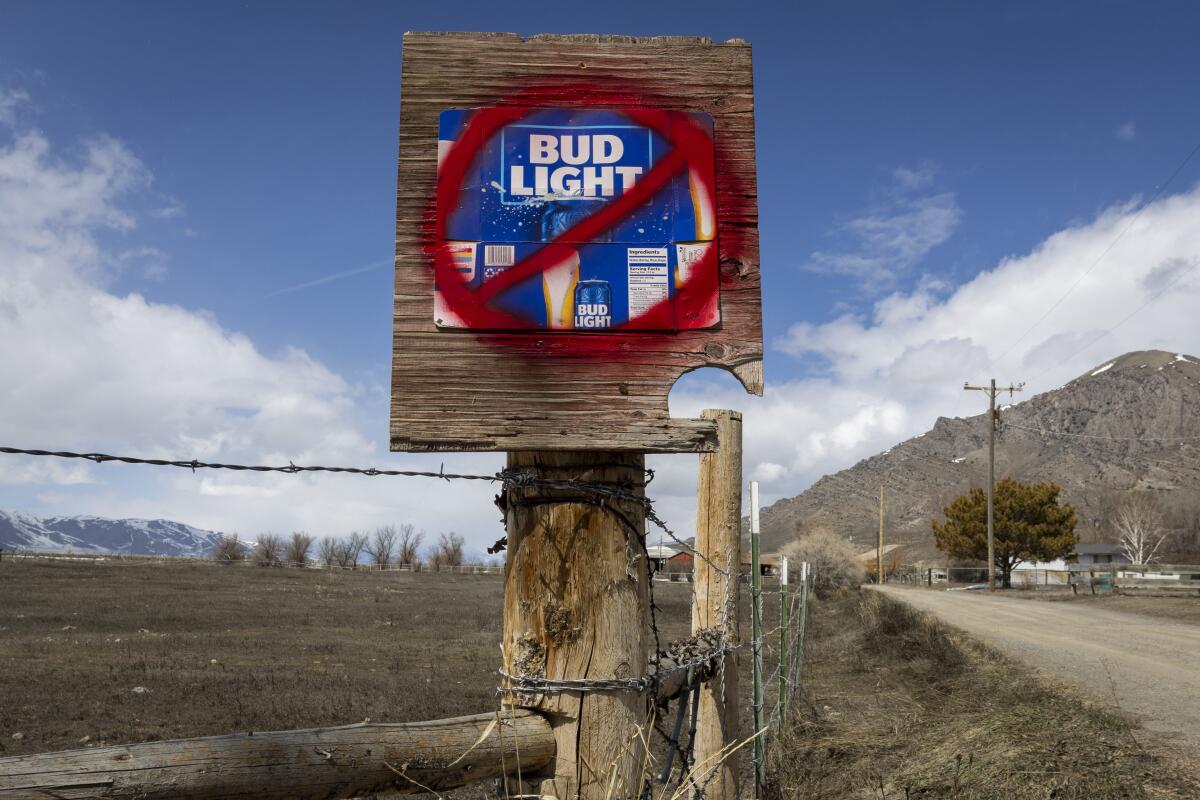
- Share via
A lot of conservatives are very excited about “Bud Lighting” — a freshly minted term for boycotting companies that cater to various “woke” causes, particularly transgender issues.
The term derives from the spectacular implosion of Bud Light in the wake of its decision in March to enlist transgender social media influencer Dylan Mulvaney to promote the brand. Bud Light’s sales have plummeted, averaging weekly declines of around 25%. Parent company Anheuser-Busch InBev has lost more than $15 billion in value. Sales of rival brands have soared, even as many retailers have slashed prices for Bud Light. Some stores are even giving Bud Light away for free, or trying to.
I am very skeptical that the Bud Light example can be replicated over the long haul, but I’m convinced that we are entering a new era of Bud Lighting on the right and left.
Anheuser-Busch InBev has put two marketing executives on leave amid conservative backlash over Bud Light’s partnership with transgender influencer Dylan Mulvaney. Here’s what you need to know.
First, some background. The most remarkable thing about the Bud Light boycott is that it worked, because boycotts usually don’t — if your definition of success is actually affecting sales and stock price in a significant way. PETA’s been boycotting KFC for 20 years to little or no effect. KFC’s biggest challenge hasn’t been from boycotters, but from rivals like Chick-fil-A, which has been going gangbusters despite facing plenty of boycotts of its own.
Why are there boycotts if they don’t work? Because the definition has changed. The goal is rarely to affect the bottom line but to hurt the reputation of the company and create headaches for management.
But even that is secondary. Most boycotts are what historian Daniel J. Boorstin called “pseudo-events,” also known as media events, which are, in Boorstin’s words, “produced by a communicator with the sole purpose of generating media attention and publicity.” A successful boycott is one that raises awareness or donations for the organizers. As Northwestern University professor Brayden King told the website Tasting Table, “The No. 1 predictor of what makes a boycott effective is how much media attention it creates, not how many people sign onto a petition or how many consumers it mobilizes.”
In other words, boycotts work for the boycotters even if they don’t work against their targets. Activist groups, on the left and right, have known this for years. The media attention provides fundraisers some evidence to donors that the group is doing something tangible.
Dylan Mulvaney has broken her silence on the transphobic backlash since her partnership with Bud Light: ‘Dehumanization has never fixed anything.’
My skepticism that the Bud Light example can be replicated stems from the particulars of the product and its market. Generic, cheap, low-calorie beer is a commodity easily replaced by competitors. What Bud Light sells is the brand. Whether you care about trans issues or not, if you’re even moderately concerned about getting grief from friends at a party, all you need to do is buy essentially the same product that’s social statement free and available right next to Bud Light at the store.
Moreover, unlike many other products, you display the brand when you consume it — it’s a visible choice. If you bought your shirt at Target, a recent focus of Bud Lighting for selling trans-friendly products, no one will be able to tell at the tailgate party. Replacing a Target shirt involves a lot more hassle and cost than replacing Bud Light.
The event, which was tweeted out by star pitcher Clayton Kershaw, is set for July 30 at Dodger Stadium.
Still, I think we’re going to see a lot more of this. In the short term, the Bud Light example is too exciting for “anti-woke” crusaders who have become rabidly anti-corporate. Once you develop a taste for takedowns, only more can satisfy. More broadly, the rise of the attention economy makes the incentives for these pseudo-events too attractive to ignore.
Besides, in a culture where everything is politicized, everything is, well, politicized. Bud Lighting is here to stay because boycotting has become a kind of reverse Veblen good. In economics, Veblen goods are things you buy not for their intrinsic worth but to display how much disposable income you have. A Marxist might call that “vice signaling.” Bud Lighting is a way to telegraph to the world the kind of person you are by what you won’t spend money on.
The lesson for corporations should be to become more conservative, not ideologically but fiduciarily. Although I don’t like some of the excesses already on display in the era of Bud Lighting, if it results in corporations retreating from politics in favor of their core mission — shareholder value — America will be better for it.
More to Read
A cure for the common opinion
Get thought-provoking perspectives with our weekly newsletter.
You may occasionally receive promotional content from the Los Angeles Times.
